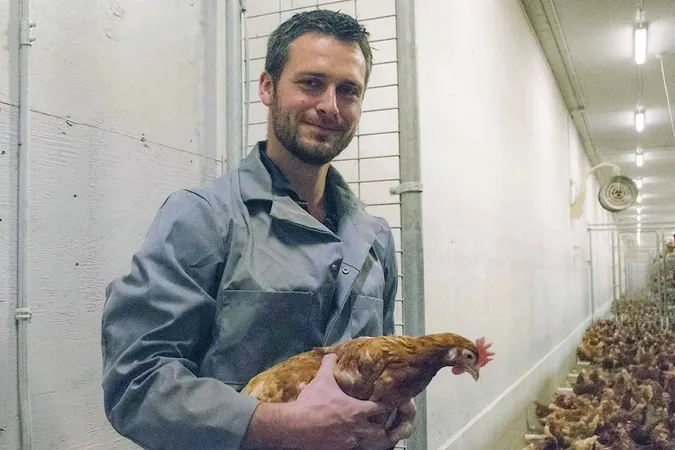
Heartbreak Across B.C. Farms: The Devastating Impact of Avian Flu
2024-11-22
Author: Michael
In the tranquil landscapes of British Columbia’s Fraser Valley, emotional turmoil is sweeping through farms as the highly pathogenic H5N1 variant of avian influenza wreaks havoc once more. Mark Siemens, a dedicated third-generation egg farmer, is among those grappling with an unexpected tragedy reminiscent of a tale shared by his grandfather about battling a mysterious illness that wiped out his chickens decades ago.
Just weeks ago, Siemens noticed unsettling behavior among his birds—itchy eyes and agitation prompted him to contact the Canadian Food Inspection Agency (CFIA). Tragically, by day's end, he learned that his entire flock was infected. "It’s super sad, and it’s a tough thing to go through when you know you care about these animals and you do everything you can to keep them healthy," said Siemens, now left with empty barns where 45,000 birds once thrived.
The current avian flu outbreak has left a staggering mark on B.C.'s poultry industry, resulting in the culling of nearly 7 million birds since spring 2022. As the migration season brings wild birds—known carriers of the flu—through the area, the disease spreads rapidly, sparking fear and heartbreak among local farmers.
"This is a very emotional and stressful time," said Siemens, reflecting on the years of effort that went into building his business. Together with health officials, he’s now focused on the daunting task of disinfecting his barns comprehensively. The provincial poultry industry has escalated biosecurity measures to a "red" level, the highest alert for safeguarding flocks.
Expressing deep concern, Shawn Hall of the B.C. Poultry Association said, "The current outbreak is very concerning for poultry and egg farmers, many of whom run family operations." Agriculture Minister Lana Popham underscored the emotional burden on poultry producers, commending their resilience during these challenging times.
As farmers like Derek Janzen in Langley face the overwhelming threat of the avian flu racing "like a wildfire" through their operations, many are left haunted by memories of having to cull entire flocks. "I have implemented strict lockdown measures on my farm," he explained, detailing the limited access allowed for delivery trucks while employing extensive protective gear for his workers.
The sense of communal grief runs deep, with farmers supporting one another through shared experiences of loss. Even as some reports emerge of unrelated hospitalizations related to the flu, farmers are focused on protecting their livelihoods. "As farmers, we typically run ourselves into the ground to ensure our animals stay healthy," said Siemens, highlighting the personal sacrifices made for his flock.
However, there are glimmers of hope. Siemens has cautiously optimistic news: he plans to source new chicks in January, eagerly anticipating a return to egg production. "We’re looking forward to placing some chicks in the new year. After that, we’ll start having eggs again," he stated, framing it as a beacon of resilience amidst the current challenges.
Despite the heavy emotional and financial toll, farmers like Siemens are reminded of their strength and ancestral history. "We’ve been here before as a family, and we’ll get through it again," he said, taking inspiration from his grandfather, a resilient Russian refugee who once faced adversity in his farming journey.
As B.C. navigates through this trying time, local communities rally to support their farmers, emphasizing the vital connection between consumers and local food sources.
This avian flu outbreak, while devastating, also serves as a testament to the determination and camaraderie among those who dedicate their lives to raising healthy livestock. The story goes beyond loss; it's a narrative of resilience, hope, and the unwavering spirit of B.C.'s agricultural community.









 Brasil (PT)
Brasil (PT)
 Canada (EN)
Canada (EN)
 Chile (ES)
Chile (ES)
 España (ES)
España (ES)
 France (FR)
France (FR)
 Hong Kong (EN)
Hong Kong (EN)
 Italia (IT)
Italia (IT)
 日本 (JA)
日本 (JA)
 Magyarország (HU)
Magyarország (HU)
 Norge (NO)
Norge (NO)
 Polska (PL)
Polska (PL)
 Schweiz (DE)
Schweiz (DE)
 Singapore (EN)
Singapore (EN)
 Sverige (SV)
Sverige (SV)
 Suomi (FI)
Suomi (FI)
 Türkiye (TR)
Türkiye (TR)